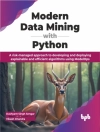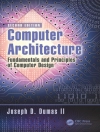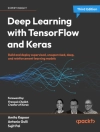Get hands-on knowledge of how BERT (Bidirectional Encoder Representations from Transformers) can be used to develop question answering (QA) systems by using natural language processing (NLP) and deep learning.
The book begins with an overview of the technology landscape behind BERT. It takes you through the basics of NLP, including natural language understanding with tokenization, stemming, and lemmatization, and bag of words. Next, you’ll look at neural networks for NLP starting with its variants such as recurrent neural networks, encoders and decoders, bi-directional encoders and decoders, and transformer models. Along the way, you’ll cover word embedding and their types along with the basics of BERT.
After this solid foundation, you’ll be ready to take a deep dive into BERT algorithms such as masked language models and next sentence prediction. You’ll see different BERT variations followed by a hands-on example of a question answering system.
Hands-on Question Answering Systems with BERT is a good starting point for developers and data scientists who want to develop and design NLP systems using BERT. It provides step-by-step guidance for using BERT.
What You Will Learn
Who This Book Is For
AI and machine learning developers and natural language processing developers.
Daftar Isi
Chapter 1: Introduction to Natural Language Processing.- Chapter 2: Introduction to Word Embeddings.- Chapter 3: BERT Algorithms Explained.- Chapter 4: BERT Model Applications – Question Answering System.- Chapter 5: BERT Model Applications – Other tasks.- Chapter 6: Future of BERT models.
Tentang Penulis
Navin is the chief architect for HCL Dry ICE Autonomics. He is an innovator, thought leader, author, and consultant in the areas of AI, machine learning, cloud computing, big data analytics, and software product development. He is responsible for IP development and service delivery in the areas of AI and machine learning, automation, AIOPS, public cloud GCP, AWS, and Microsoft Azure. Navin has authored 15+ books in the areas of cloud computing , cognitive virtual agents, IBM Watson, GCP, containers, and microservices. Amit Agrawal is a senior data scientist and researcher delivering solutions in the fields of AI and machine learning. He is responsible for designing end-to-end solutions and architecture for enterprise products. He has also authored and reviewed books in the area of cognitive virtual assistants.












